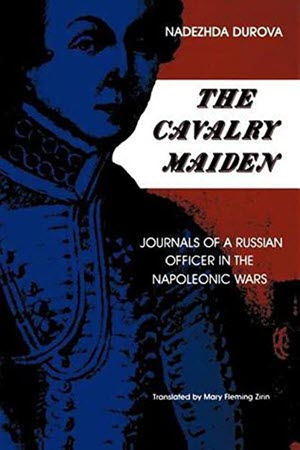The Cavalry Maiden
 When you think of trans autobiographies, you don’t often think of interesting history books. Even I don’t. I have, after all, read quite a few, and have mostly given up on the genre. There are a few, however, that were written centuries ago, and are much more interesting than the modern fare.
When you think of trans autobiographies, you don’t often think of interesting history books. Even I don’t. I have, after all, read quite a few, and have mostly given up on the genre. There are a few, however, that were written centuries ago, and are much more interesting than the modern fare.
The Cavalry Maiden was written by Aleksandr Aleksandrov, a Ukrainian trans man who ran away from home and family to undergo social transition, and to join the fight against Napoleon. He served with honour for around 10 years, including fighting at the famous battle of Borodino. After Napoleon’s final defeat at Waterloo, he continued living as male until his death, by which time he had spent 60 of his 83 years as a man.
The book exists, in part, because Aleksandrov kept copious diaries during his time in the army, and in part because his younger brother Vasilii, an inveterate gambler perpetually in need of cash, suggested to the great Alexander Pushkin that the diaries might sell well. Pushkin agreed. It is clear that both he and Vasilii thought a tale of a young girl disguised as a man to fight Bonaparte would be a literary sensation. Neither of them thought much about the fact that Aleksandrov didn’t see what he had done as a disguise. As a result, the final book bears some similarity to the modern trans biography.
Some of the material was published in a magazine that Pushkin edited, but his untimely death in a duel put an end to immediate plans for a full volume. The final version saw Aleksandrov much more in control of the narrative. Thanks to this, the bulk of the book is not so much a tale of gender transgression as the memoir of a young cavalry officer.
Aleksandrov’s unusual nature became known to the higher echelons of the Russian army early on. Consequently he became acquainted with major figures of the time such as Tsar Aleksandr I (who awarded him a medal and granted him the right to use Aleksandrov as a patronymic) and Marshall Kutusov. But mostly these are minor characters.
For the military historian, the more interesting content is the coverage of the War of 1812 itself. Aleksandrov reports the frustration rife in the Russian army as their commanders order retreat after retreat in the face of the French. It isn’t until after Borodino, when Napoleon is holed up in Moscow with winter approaching, that the ordinary soldiers realize what a clever trap has been sprung.
Aleksandrov took a nasty leg wound at Borodino and was ordered home to recuperate by Kutusov, on whose staff he was then serving. When he was well enough to ride again, he set off in search of his regiment. We get a harrowing tale of his journey through Russia in the spring, when the snow is melting and the air is thick with the smell of rotting French corpses. We also learn that some of the French were so confident of victory that they had brought their families with them in the expectation of being granted large estates on which to live.
The book ends with the war, and for details of Aleksandrov’s life thereafter (for an LGBTQ+ History Month talk I gave) I am indebted to Dr Margarita Vaysman of the University of St. Andrews. She has managed to get hold of Aleksandrov’s military records, and letters between him, Vasilii and Pushkin, which she has translated for the likes of me to work with. Maybe that will become a book one day.
The one downside of The Cavalry Maiden as a book is that it was translated in 1988 and the translator clearly had no understanding of trans people. Indeed I don’t think she was capable of understanding why Aleksandrov lived as he did. I understand that there’s another translation, which I should read. But I have no reason to believe that Aleksandrov’s reports of wars in which he fought are anything other than genuine. If Napoleonic military history is your thing, you may find the book interesting.

Title: The Cavalry Maiden
By: Aleksandr Aleksandrov
Publisher: Indiana University Press
Purchase links:
Amazon UK
Amazon US
See here for information about buying books though Salon Futura